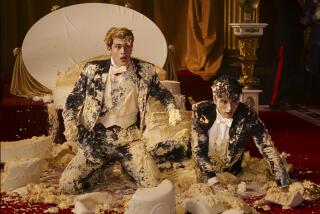Book Review : The State of Affairs in a Patriarchy
Second Son by Robert Ferro (Crown: $17.95; 215 pages)
Robert Ferro’s earlier novel, “The Family of Max Desir,” centered around a beloved son of a large family whose ties to each other were very strong. The catch in Max’s case was that he happened to be gay, and the central scene revolved around the fact that Max’s lover was denied his place on a (literal) family tree--an embroidered artifact in which husbands and wives, brothers and sisters, uncles and aunts and all manner of sundry children, got to be emblazoned on this bit of cloth, but when Max and his lover appeared, “in print” as it were, Max’s father threw a fit. No place, the author complained, there is no place at all, even now, for homosexual relationships within the conventional, heterosexual, patriarchal society.
“Second Son” again renews and explores this state of affairs. Once more, Robert Ferro creates a strong and (intermittently) loving family. Once again there is a lovely old beach house where for years this family has congregated. Once again there are relatives all over the place: Mark Valerian, the hero--the gay, “second” son, has an older brother, whose god is the dollar sign.
He also has two sisters, one a career woman, the other a mom: “Tessa had recently lost as much as 40 pounds--legacy of this final pregnancy . . . . She had done what gay men discovered they could do in the ‘70s: demand and achieve radically improved bodies. At this same weight, after a similar diet four years before, she had been unexpectedly impregnated. The idea in the family was that this could now happen again.”
Promise of a New Life
So, a beautiful body for a Valerian sister promises new life. But Mark’s beautiful body has had devastating consequences both for himself and the rest of his family. Mark is sick, and probably dying, from a lingering illness that Ferro sees fit not to name. As the novel opens, the Valerian family, old Mr. Valerian, whose wife died just last year, and the four grown children, congregate.
There has been an offer to buy the beach house--the only really lovely material thing the family owns. Mr. Valerian and his older son are all for it, but Mark, who alone of his family appears to appreciate beauty for its own sake--as well as what the house means in terms of sacred memories of his mother, who died there--repudiates the plan. Not as long as he’s alive! The catch is, again, how long is Mark going to be alive?
Escapes Obligations
Once this central premise is established, Mark goes to Rome. From his entangling familial obligations he escapes into another kind of life; ultra-sophisticated, where “it is no longer fashionable to be fashionable.” Mark decorates an apartment for a client: “A bathroom had been mirrored. The ceiling and the dining room was polished brass, the walls in the foyer black glass. A number of architectural details had been carefully picked out in faux marbre. Rugs were down. A black ebony piano had come through the new window by crane. . . .”
But still Mark is sick. The lines are plainly drawn: The heterosexual world--money-grubbing, impervious to beauty, but having children by the carload--is pretty clearly made up here of second-class citizens in Ferro’s world view. But the gay world--elegant and sensitive, contributors of so much beauty to the grim charade we call civilization--has come to a kind of dead end. It requires the attention of “straight” citizenry, simply to stay alive.
About a third of the way through this narrative, Mark falls in love with Bill Mackey, also very ill (his previous lover has already died a grisly death). Their relationship is described in unabashedly romantic terms.
The last third of the book is taken up with questions of morality and destruction. Just before or during the time that Mark and Bill fall in love, the Soviet nuclear incident occurs. A friend of Mark’s outrageously camps up Chernobyl: “The Russians darling . . . two thousand dead. BooBoo Payne’s picnic heinously ruined. Flowers that glow. Cows that can’t stop leaping. Enormous emeralds lying on the ground. Hollow zucchinis. Fabulous sunsets. . . .”
Back home, where Mr. Valerian still plots to sell the house, it turns out his grief about his wife is largely bogus; for all these years he’s been fooling around with his secretary. Against this public and private chicanery, where does the straight world get off, condemning gays with their illness?
While some of Mark’s friends engage in crack-brain schemes to literally leave the planet and live in space, Mark takes a stand, with his family: They must recognize him, and recognize his lover. It’s “The Family of Max Desir” played back again, with stately beauty, made profound by the addition of a new character; not a cousin or an uncle this time, but Death itself, in all its horror and strange, spooky beauty.
More to Read
Sign up for our Book Club newsletter
Get the latest news, events and more from the Los Angeles Times Book Club, and help us get L.A. reading and talking.
You may occasionally receive promotional content from the Los Angeles Times.






